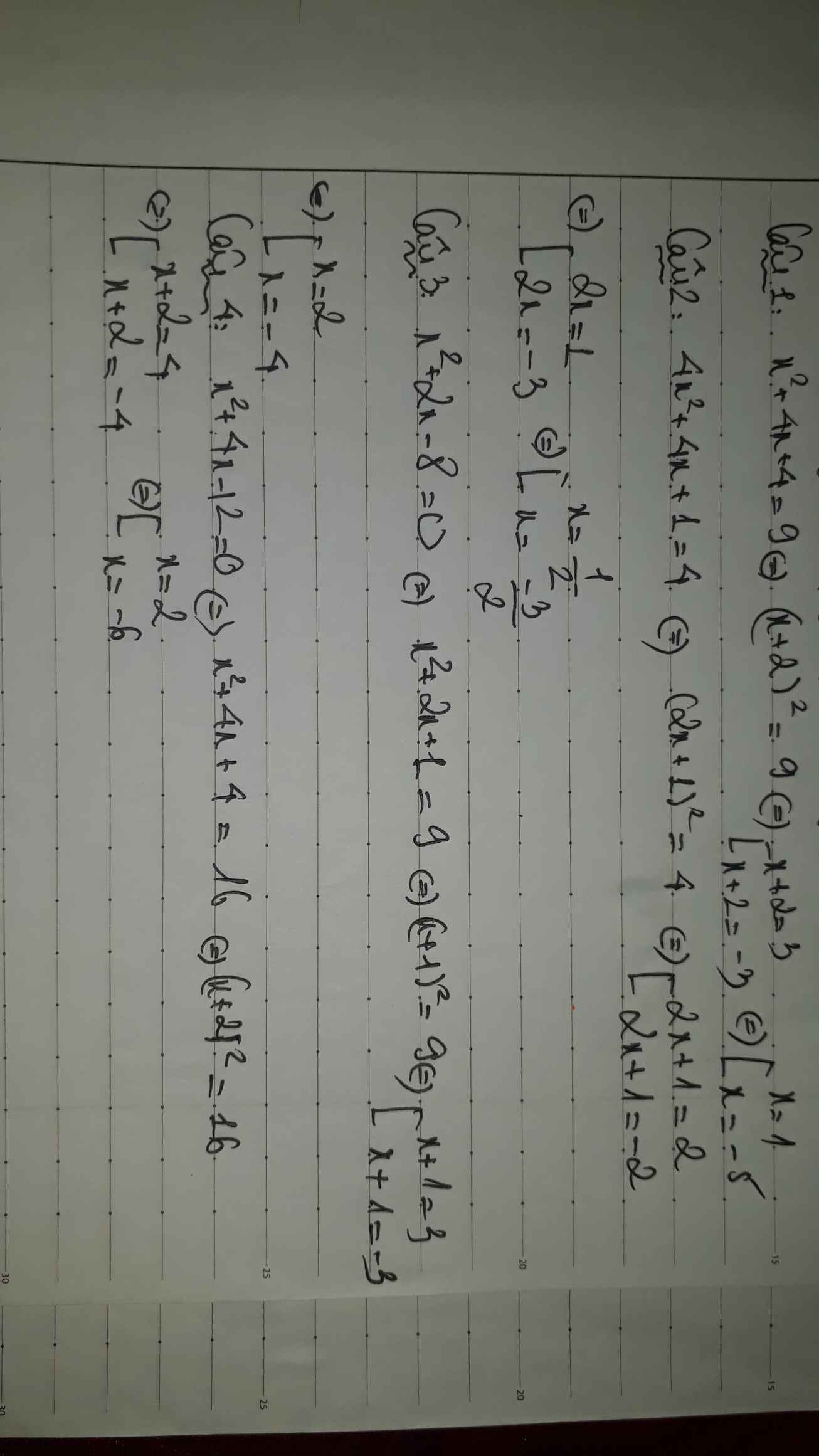(2x-5)2 - x2 - 4x - 4 = 0

Những câu hỏi liên quan
Giải các phương trình tích sau: Mng giúp em với ạ.
a) (3x – 2)(4x + 5) = 0 b) (2,3x – 6,9)(0,1x + 2) = 0
c) 2x(x – 3) + 5(x – 3) = 0 d) (3x – 1)(x2 + 2) = (3x – 1)(7x – 10)
e) (x + 2)(3 – 4x) = x2 + 4x + 4 f) x(2x – 7) – 4x + 14 = 0
g) (2x – 5)2 – (x + 2)2 = 0 h) (x2 – 2x + 1) – 4 = 0
i) 3x2 + 2x – 1 = 0 k) x2 – 5x + 6 = 0
l) x2 – 3x + 2 = 0 m) 2x2 – 6x + 1 = -3
a: (3x-2)(4x+5)=0
=>3x-2=0 hoặc 4x+5=0
=>x=2/3 hoặc x=-5/4
b: (2,3x-6,9)(0,1x+2)=0
=>2,3x-6,9=0 hoặc 0,1x+2=0
=>x=3 hoặc x=-20
c: =>(x-3)(2x+5)=0
=>x-3=0 hoặc 2x+5=0
=>x=3 hoặc x=-5/2
Đúng 0
Bình luận (0)
Giải các phương trình tích sau:1.a)(3x – 2)(4x + 5) 0 b) (2,3x – 6,9)(0,1x + 2) 0c)(4x + 2)(x2 + 1) 0 d) (2x + 7)(x – 5)(5x + 1) 02. a)(3x + 2)(x2 – 1) (9x2 – 4)(x + 1) b)x(x + 3)(x – 3) – (x + 2)(x2 – 2x + 4) 0c)2x(x – 3) + 5(x – 3) 0 d)(3x – 1)(x2 + 2) (3x – 1)(7x – 10)3.a)(2x – 5)2 – (x + 2)2 0 b)(3x2 + 10x – 8)2 (5x2 – 2x + 10)2c)(x2 – 2x + 1) – 4 0 d)4x2 + 4x + 1 x24. a) 3x2 + 2x – 1 0 b) x2 – 5x + 6 0c) x2 – 3x + 2 0 d) 2x2 – 6x + 1 0 ...
Đọc tiếp
Giải các phương trình tích sau:
1.a)(3x – 2)(4x + 5) = 0 b) (2,3x – 6,9)(0,1x + 2) = 0
c)(4x + 2)(x2 + 1) = 0 d) (2x + 7)(x – 5)(5x + 1) = 0
2. a)(3x + 2)(x2 – 1) = (9x2 – 4)(x + 1)
b)x(x + 3)(x – 3) – (x + 2)(x2 – 2x + 4) = 0
c)2x(x – 3) + 5(x – 3) = 0 d)(3x – 1)(x2 + 2) = (3x – 1)(7x – 10)
3.a)(2x – 5)2 – (x + 2)2 = 0 b)(3x2 + 10x – 8)2 = (5x2 – 2x + 10)2
c)(x2 – 2x + 1) – 4 = 0 d)4x2 + 4x + 1 = x2
4. a) 3x2 + 2x – 1 = 0 b) x2 – 5x + 6 = 0
c) x2 – 3x + 2 = 0 d) 2x2 – 6x + 1 = 0
e) 4x2 – 12x + 5 = 0 f) 2x2 + 5x + 3 = 0
Bài 1:
a) (3x - 2)(4x + 5) = 0
<=> 3x - 2 = 0 hoặc 4x + 5 = 0
<=> 3x = 2 hoặc 4x = -5
<=> x = 2/3 hoặc x = -5/4
b) (2,3x - 6,9)(0,1x + 2) = 0
<=> 2,3x - 6,9 = 0 hoặc 0,1x + 2 = 0
<=> 2,3x = 6,9 hoặc 0,1x = -2
<=> x = 3 hoặc x = -20
c) (4x + 2)(x^2 + 1) = 0
<=> 4x + 2 = 0 hoặc x^2 + 1 # 0
<=> 4x = -2
<=> x = -2/4 = -1/2
d) (2x + 7)(x - 5)(5x + 1) = 0
<=> 2x + 7 = 0 hoặc x - 5 = 0 hoặc 5x + 1 = 0
<=> 2x = -7 hoặc x = 5 hoặc 5x = -1
<=> x = -7/2 hoặc x = 5 hoặc x = -1/5
bài 2:
a, (3x+2)(x^2-1)=(9x^2-4)(x+1)
(3x+2)(x-1)(x+1)=(3x-2)(3x+2)(x+1)
(3x+2)(x-1)(x+1)-(3x-2)(3x+2)(x+1)=0
(3x+2)(x+1)(1-2x)=0
b, x(x+3)(x-3)-(x-2)(x^2-2x+4)=0
x(x^2-9)-(x^3+8)=0
x^3-9x-x^3-8=0
-9x-8=0
tự tìm x nha
Đúng 0
Bình luận (0)
Hãy giải các phương trình sau đây :
1, x2 - 4x + 4 = 0
2, 2x - y = 5
3, x + 5y = - 3
4, x2 - 2x - 8 = 0
5, 6x2 - 5x - 6 = 0
6,( x2 - 2x )2 - 6 (x2 - 2x ) + 5 = 0
7, x2 - 20x + 96 = 0
8, 2x - y = 3
9, 3x + 2y = 8
10, 2x2 + 5x - 3 = 0
11, 3x - 6 = 0
1) Ta có: \(x^2-4x+4=0\)
\(\Leftrightarrow\left(x-2\right)^2=0\)
\(\Leftrightarrow x-2=0\)
hay x=2
Vậy: S={2}
Đúng 1
Bình luận (0)
1) (3x - 2)(4x + 5) = 0
2) (4x + 2)(x2 + 3) = 0
3) (2x + 7)(x - 3)(5x - 1) = 0
4) x2 - 3x = 0
5) x2 - x = 0
1
(3x-2)(4x+5)=0
⇔ 3x-2=0 -> x= 2/3
⇔ 4x-5=0 x= 5/4
Vậy tập nghiệm S = { 2/3; 5/4}
Đúng 1
Bình luận (0)
2, (4x+2)(\(X^2\)+3)=0
⇔ 4x+2=0 -> x= -1/2
\(x^2\)+3=0 -> x= \(\sqrt{3}\); -\(\sqrt{3}\)
Vaayj tập nghiệm S= { -1/2; \(\sqrt{3}\);-\(\sqrt{3}\)}
Đúng 1
Bình luận (0)
3)
(2x+7)(x-3)(5x-1)=0
⇔ 2x+7=0 -> x= -7/2
x-3 =0 -> x = 3
5x-1 =0 -> x= 1/5
Vậy tập nghiệm S={ -7/2; 3; 1/5}
Đúng 1
Bình luận (0)
Xem thêm câu trả lời
Giải các phương trình sau:a)
x
2
–l0x -25; b) 4
x
2
- 4x -1;c)
(
1
-
2
x
)
2
(
3
x
-
2...
Đọc tiếp
Giải các phương trình sau:
a) x 2 –l0x = -25; b) 4 x 2 - 4x = -1;
c) ( 1 - 2 x ) 2 = ( 3 x - 2 ) 2 ; d) ( x - 2 ) 3 + ( 5 - 2 x ) 3 =0.
a) x = 5. b) x = 1 2 .
c) x = 3 5 hoặc x = 1. d) x = 3.
Đúng 0
Bình luận (0)
\(a,x^2-10x=-25\)
\(< =>x^2-10x+25=0\)
\(< =>\left(x-5\right)^2=0< =>x=5\)
b, \(4x^2-4x=-1\)
\(< =>4x^2-4x+1=0\)
\(< =>\left(2x-1\right)^2=0< =>x=\frac{1}{2}\)
c,\(\left(1-2x\right)^2=\left(3x-2\right)^2\)
\(< =>\left(1-2x\right)^2-\left(3x-2\right)^2=0\)
\(< =>\left(1-2x-3x+2\right)\left(1-2x+3x-2\right)=0\)
\(< =>\left(-5x+3\right)\left(x-1\right)=0\)
\(< =>\orbr{\begin{cases}x=\frac{3}{5}\\x=1\end{cases}}\)
d, \(\left(x-2\right)^3+\left(5-2x\right)^3=0\)
\(< =>\left(x-2+5-2x\right)\left(x^2-4x+4+5x-2x^2-10+4x+25-20x+4x^2\right)=0\)
\(< =>\left(3-x\right)\left(-5x^2-15x+19\right)=0\)
\(< =>\left(x-3\right)\left(5x^2+15x-19=0\right)\)
\(< =>\orbr{\begin{cases}x=3\\x^2+3x-\frac{19}{5}=0\end{cases}}\)
Xét phương trình \(x^2+3x-\frac{19}{5}=0< =>\left(x^2+2.x.\frac{3}{2}+\frac{9}{4}\right)-\left(\frac{19}{5}+\frac{9}{4}\right)=0\)
\(< =>\left(x+\frac{3}{2}\right)^2=\frac{29}{5}+\frac{1}{4}\)
\(< =>\orbr{\begin{cases}x=\sqrt{\frac{29}{5}+\frac{1}{4}}-\frac{3}{2}\\x=-\sqrt{\frac{29}{5}+\frac{1}{4}}-\frac{3}{2}\end{cases}}\)
Vậy .........
Xem thêm câu trả lời
Chứng minh rằng
a) – x2 + 4x – 5 < 0 với mọi x
b) x4 + 3x2 + 3 > 0 với mọi x
c) (x2 + 2x + 3)(x2 + 2x + 4) + 3 > 0 với mọi x
a: Ta có: \(-x^2+4x-5\)
\(=-\left(x^2-4x+5\right)\)
\(=-\left(x^2-4x+4+1\right)\)
\(=-\left(x-2\right)^2-1< 0\forall x\)
Đúng 0
Bình luận (1)
b: Ta có: \(x^4\ge0\forall x\)
\(3x^2\ge0\forall x\)
Do đó: \(x^4+3x^2\ge0\forall x\)
\(\Leftrightarrow x^4+3x^2+3>0\forall x\)
c: Ta có: \(\left(x^2+2x+3\right)=\left(x+1\right)^2+2>0\forall x\)
\(x^2+2x+4=\left(x+1\right)^2+3>0\forall x\)
Do đó: \(\left(x^2+2x+3\right)\left(x^2+2x+4\right)>0\forall x\)
\(\Leftrightarrow\left(x^2+2x+3\right)\left(x^2+2x+4\right)+3>0\forall x\)
Đúng 1
Bình luận (0)
Chứng minh rằng
a) – x2 + 4x – 5 < 0 với mọi x
b) x4 + 3x2 + 3 > 0 với mọi x
c) (x2 + 2x + 3)(x2 + 2x + 4) + 3 > 0 với mọi x
b: Ta có: \(x^4\ge0\forall x\)
\(3x^2\ge0\forall x\)
Do đó: \(x^4+3x^2\ge0\forall x\)
\(\Leftrightarrow x^4+3x^2+3>0\forall x\)
c: Ta có: \(\left(x^2+2x+3\right)=\left(x+1\right)^2+2>0\forall x\)
\(x^2+2x+4=\left(x+1\right)^2+3>0\forall x\)
Do đó: \(\left(x^2+2x+3\right)\left(x^2+2x+4\right)>0\forall x\)
\(\Leftrightarrow\left(x^2+2x+3\right)\left(x^2+2x+4\right)+3>0\forall x\)
Đúng 1
Bình luận (0)
1) (x2-4x+16) (x+4)-x(x+1) (x+2)+3x2=0
2) (8x+2) (1-3x)+(6x-1) (4x-10)=-50
3) (x2+2x+4) (2-x)+x(x-3) (x+4)-x2+24=0
4) (\(\dfrac{x}{2}\)x2+3) (5-6x)+(12x-2) (\(\dfrac{x}{4}\)x4+3)=0
1)(x2-4x+16)(x+4)-x(x+1)(x+2)+3x2=0
\(\Rightarrow\)(x3+64)-x(x2+2x+x+2)+3x2=0
\(\Rightarrow\)x3+64-x3-2x2-x2-2x+3x2=0
\(\Rightarrow\)-2x+64=0
\(\Rightarrow\)-2x=-64
\(\Rightarrow\)x=\(\dfrac{-64}{-2}\)
\(\Rightarrow x=32\)
Đúng 1
Bình luận (0)
2)(8x+2)(1-3x)+(6x-1)(4x-10)=-50
\(\Rightarrow\)8x-24x2+2-6x+24x2-60x-4x+10=50
\(\Rightarrow\)-62x+12=50
\(\Rightarrow\)-62x=50-12
\(\Rightarrow\)-62x=38
\(\Rightarrow\)x=\(-\dfrac{38}{62}=-\dfrac{19}{31}\)
Đúng 1
Bình luận (0)
3)(x2+2x+4)(2-x)+x(x-3)(x+4)-x2+24=0
\(\Rightarrow\)8-x3+x(x2+4x-3x-12)-x2+24=0
\(\Rightarrow\)8-x3+x3+4x2-3x2-12x-x2+21=0
\(\Rightarrow\)-12x+29=0
\(\Rightarrow\)-12x=-29
\(\Rightarrow\)x=\(\dfrac{-29}{-12}=\dfrac{29}{12}\)
Đúng 1
Bình luận (0)
Tim x, biết:
Câu 1. x2 + 4x + 4 = 9
Câu 2. 4x2 + 4x + 1 = 4
Câu 3. x2 + 2x - 8 =0
Câu 4. x2 + 4x - 12 = 0
Phương trình nào sau đây tương đương,không tương đương
a) 2(x-5)=2(2x-3)-2x và -3x2-7=0
b) 2x-3 phần 5 - 7x-2 phần 4 =3 và x2-4x-4=0
\(a,2\left(x-5\right)=2\left(2x-3\right)\)
\(\Leftrightarrow2x-10-4x+6=0\)
\(\Leftrightarrow-2x=4\)
\(\Leftrightarrow x=-2\)
\(-3x^2-7=0\Leftrightarrow x^2=-\dfrac{7}{3}\Leftrightarrow\) pt vô nghiệm
Vậy 2 pt ko tương đương
\(b,\dfrac{2x-3}{5}-\dfrac{7x-2}{4}=3\)
\(\Leftrightarrow4\left(2x-3\right)-5\left(7x-2\right)-3.20=0\)
\(\Leftrightarrow8x-12-35x+10-60=0\)
\(\Leftrightarrow-27x=62\)
\(\Leftrightarrow x=-\dfrac{62}{27}\)
\(x^2-4x-4=0\Leftrightarrow\left(x-2\right)^2=0\Leftrightarrow x=2\)
Vậy 2 pt ko tương đương
Đúng 0
Bình luận (2)
a: 2(2x-3)-2x=2(x-5)
=>4x-6-2x=2x-10
=>2x-6=2x-10
=>-6=-10(loại)
=>PTVN
-3x^2-7=0
=>3x^2+7=0
=>x^2=-7/3(loại)
=>PTVN
=>Hai phương trình tương đương
b: \(\dfrac{2x-3}{5}-\dfrac{7x-2}{4}=3\)
=>4(2x-3)-5(7x-2)=60
=>8x-12-35x+10=60
=>-27x-2=60
=>-27x=62
=>x=-62/27
x^2-4x-4=0
=>x^2-4x+4-8=0
=>(x-2)^2-8=0
=>x=2 căn 2+2 hoặc x=-2 căn 2+2
=>Hai phương trình ko tương đương
Đúng 0
Bình luận (0)

























